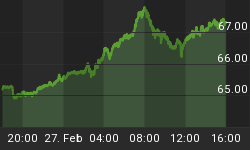Long ago, before economic models developed their current levels of sophistication, it used to be that the goal of a government's economic policy was to bring prosperity to its citizens; in other words, to raise the general level of material comfort, while at the same time reducing the amount of toil required to attain that end.
However, due to the blather spouted by modern economists, success is no longer measured in those terms. Instead, governments simply look to pump up nominal levels of gross domestic product (GDP), while simultaneously catering to the needs of entrenched political classes. As exports feed directly into GDP, currency devaluation has been widely used as a means to boost exports and therefore achieve 'prosperity.' In this model, selling is an end unto itself. There is no focus whatsoever paid to the obviously negative consequences of currency debasement: diminished purchasing power and lowered living standards.
Way back in the 20th century, a nation's currency was viewed much as a company's stock price. The reliability, competitiveness, and growth of a national economy usually translated into a strong currency. This system made sense.
Countries that offered the most fertile soil for investment capital or that made products other countries wanted would attract funds from abroad. Demand for the currency of these "blue chip" countries (which was needed to invest or buy locally) would inevitably push up the value of the currency. And so, much as shareholders of successful companies are rewarded by higher stock prices, citizens of successful countries were rewarded with stronger currencies - with which they could buy more goods and services both domestically and internationally, raising their living standards.
But all that has changed in recent years. With a strategy that seems to be taken from the playbook of Sam Walton, governments now look to take market share from competitors by lowering the cost of their exports. To do this, they have adopted a beggar-thyself policy of habitual currency debasement. Although such a move may benefit those who buy the products, it is a burden to the country's own workers who, like Wal-Mart employees, have to get by on subsistence wages. While the markets like a low-cost provider, this is not a niche that everyone can, or should, fill. While some will compete only on price, more successful ventures will compete on quality and innovation. For every Kia, there is a Mercedes Benz.
For the remainder of this article, and for a look at reasons why you may want to invest in Australia (a country that is resisting the urge to debase), go to the latest edition of Euro Pacific Capital's Global Investor Newsletter.
Click here to download Peter's latest Special Report: My Five Favorite Gold & Silver Mining Stocks.
Be sure to pick up a copy of Peter Schiff's just-released economic fable, How an Economy Grows and Why It Crashes.















